Best motherboard Australia
Which is the best motherboard in 2025?
VIEW OFFERBest of 2025: Find the right motherboard in Australia
Every part of your PC needs to be just right, which can make choosing a great motherboard incredibly daunting. Being the main component that ties your PC together, there are a lot of considerations to make before choosing a motherboard, so it helps to know what you need and why you need it. Check out this guide for everything you need to know to find the best motherboard for your computer:
The 10 best motherboards in Australia (February 2025)
The bestseller list compares motherboards from multiple brands
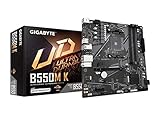
- Connectivity: PCIe 4.0 and dual M.2 slots for ultra-fast performance and storage options.
- Memory: Four DDR4 DIMM slots for high-speed, dual-channel RAM configurations.
- Compatibility: Supports latest AMD Ryzen processors, ensuring future-proofing and upgrade potential.

- Speed: PCIe 4.0, M.2 Shield Frozr, and Turbo USB 3.2 GEN 2 for fast gaming.
- Memory: Supports dual channel DDR4 up to 128 GB at 4400 MHz.
- Compatibility: Support for 3rd Gen and future AMD Ryzen processors.
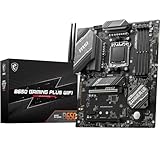
- Memory: Supports DDR5 memory, up to 6600+ (OC) MHz.
- Cooling: Advanced heatsink design with Shield Frozr for high performance.
- Compatibility: Supports AMD Ryzen 7000 Series desktop processors.
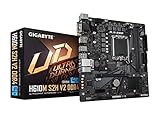
- Design: 6+1+1 Hybrid Digital VRM for stable power delivery.
- Connectivity: Features PCIe 4.0, NVMe, and USB 3.2 ports.
- Compatibility: Supports Intel 13th/12th Gen CPUs and DDR4 RAM.
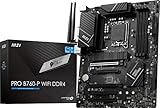
- Cooling: Extended Heatsink and MOSFET thermal pads rated for 7W/mK.
- Performance: 12+1 Duet Rail Power System and Dual Channel DDR4 5333+MHz (OC).
- Compatibility: Supports 12th/13th Gen Intel Core, Pentium Gold, and Celeron processors.
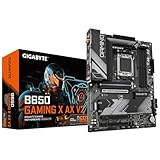
- Memory: Dual Channel DDR5 with AMD EXPO and Intel XMP support.
- Performance: Direct 8+2+2 phase digital VRM solution ensures top-notch performance.
- Compatibility: Supports latest AMD Ryzen 7000/8000 series processors with AM5 socket.
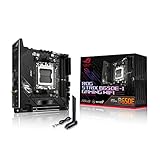
- Connectivity: USB 3.2 Gen 2x2 Type-C and multiple additional ports included.
- Power: 10+2 Power Stages ensure robust and durable power delivery.
- Compatibility: Supports AMD Ryzen 7000 with AM5 socket.
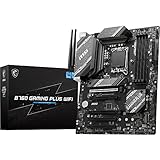
- Connectivity: Intel Wi-Fi 6E module with Bluetooth 5.3 & 2.5Gbps LAN.
- Memory: Supports DDR5 memory, up to 6800+ MHz with Memory Boost.
- Compatibility: Supports Intel 12th & 13th Gen Core, Pentium Gold, and Celeron processors.
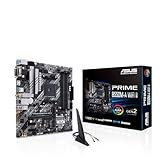
- Connectivity: Realtek 1Gbps LAN, WiFi 6, PCIe 4.0, HDMI 2.0, Displayport, M.2, USB 3.2 Gen.
- Memory: Four DDR4 slots support up to 128GB of total RAM.
- Compatibility: Supports AMD Ryzen 5000, 5000 G, 4000 G, and 3000 series processors.

- Power: 12plus1 Duet Rail Power System, optimized for enhanced stability and performance.
- Performance: Dual Channel DDR5 6800plusMHz (OC) for faster data transfer and multitasking.
- Compatibility: Supports latest Intel Core, Pentium, and Celeron processors for LGA 1700 socket.
Affiliate link: We are a participant of the Amazon Associates Program. If you buy a product through this link we might earn a small commission from Amazon at no extra charge for you. As an Amazon Associate we earn from qualifying purchases.
- Read the definitive motherboard buying guide
- View the motherboard picks and see how they rank in the top list
motherboard buying guide
Do you want to buy a good motherboard? This is all you need to know.
A short explanation: What are motherboards?
A motherboard is one of the most important components of a desktop computer, being a type of circuit board that all other components are connected to. For example, the computer’s processor, memory, hard drives, graphics card, and other add-on boards will all communicate and connect with the motherboard. All power needs also run through the motherboard, with fans and other components connected to it too.
What are the benefits of good motherboards?
The best motherboards are necessary for anyone that wants to upgrade their computer as they work as the hub for all other components, i.e., the CPU, GPU, etc. While they won’t improve the performance of a computer below what the specs are, a great motherboard can turbocharge the performance of a high-end CPU, RAM, and other components. Most people buy motherboards as a direct replacement for their current board, allowing them to upgrade the system to the latest hardware and technologies. This is great for running the newest video games, editing 4K videos, and any other hardware-intensive tasks.
How to choose the best motherboard in 2025?
Choosing the right motherboard requires a bit of research, much like any other computer component. Here are some important things to consider when buying a new motherboard:
- CPU Socket: The socket of the motherboard needs to match the CPU chip you are using, otherwise the CPU is not going to work. CPU sockets currently come in three size categories (PGA, BGA, lidded LGA) and each type is incompatible with the others, so be sure that the socket of the motherboard is the exact match for the CPU.
- Size: Motherboards come in a few different size options, so choose one that fits inside your computer case. The most common motherboard form factors are ATX and microATX, with the former being a full-size motherboard and the latter being a more compact version. A smaller motherboard may have fewer expansion slots but can still be an efficient choice for other hardware.
- Expansion Slots: One of the most important features of a motherboard, the expansion slots allows for various components to be installed on the motherboard. For example, a GPU is typically too large to be integrated into the motherboard, so requires an expansion slot. The most common expansion slot is PCI, which is used for installing graphics cards, sound cards, and internal modems. It can be beneficial to have multiple expansion slots for installing different components, so be sure to go for a full-size motherboard if you intend to install several GPUs.
Which types of motherboards are available to buy in Australia?
There are several types of motherboards available. They are categorized by the size and shape of the board, providing a variety of options when it comes to a PC build:
- ATX Motherboard: One of the most popular sizes of motherboard, ATX are typically reserved for use with desktop PCs. It’s got many memory slots, PCI slots, and graphic ports, which have made it a popular choice for playing games, watching videos, and using video and audio editing software.
- Mini ATX Motherboard: Much smaller than an ATX motherboard, a micro ATX motherboard can still be used on a desktop PC but it will need a smaller-sized tower. Fewer connectors are provided, although it can still support between 2 to 4 memory slots and PCI slots.
- Mini ITX Motherboard: The smallest motherboard out there, a Mini ITX motherboard is most commonly used in smaller form personal computers like compact HTPC and home streaming PCs. It offers connectors in scarce amounts, with only a single PCI slot and 1 to 2 memory slots, although they can still operate the same as other larger motherboards.
